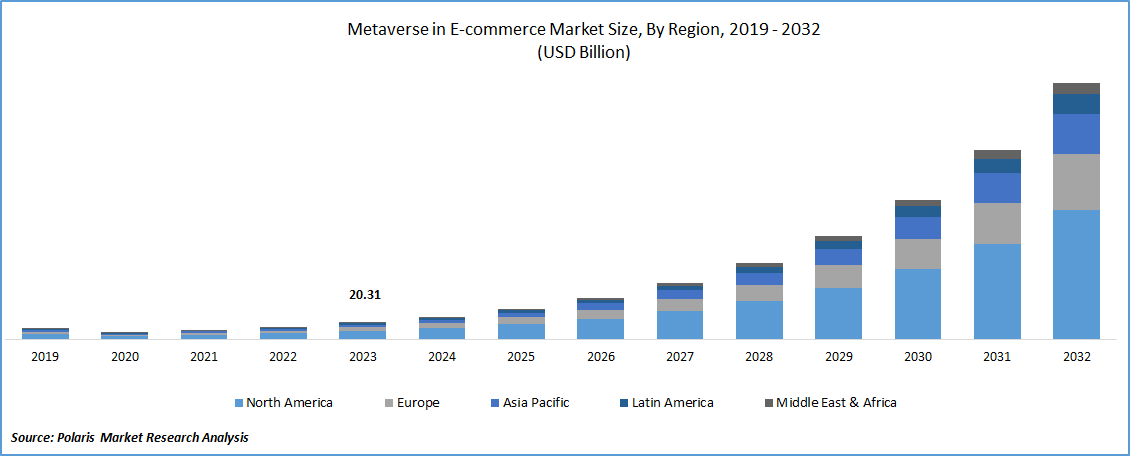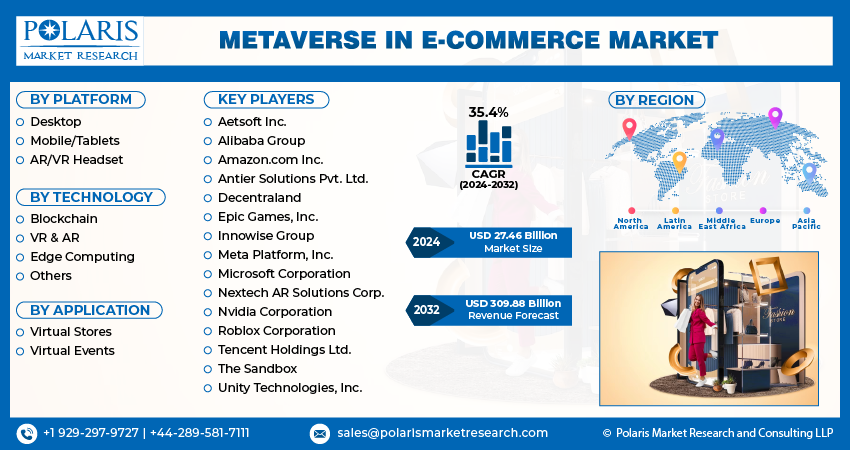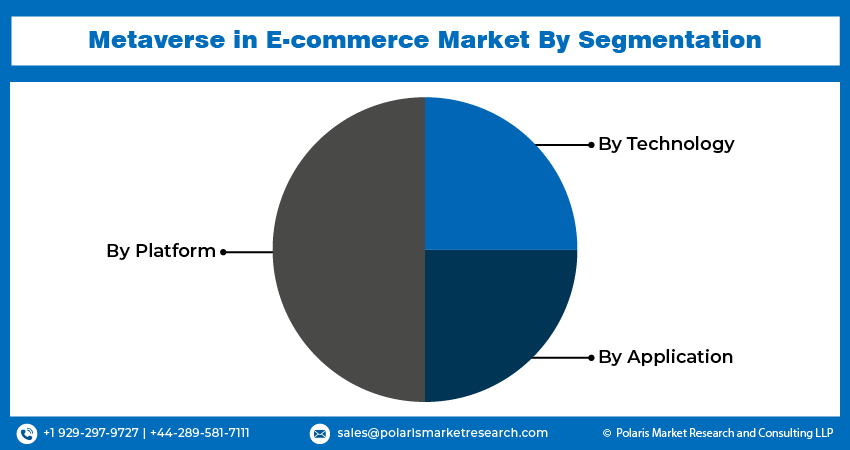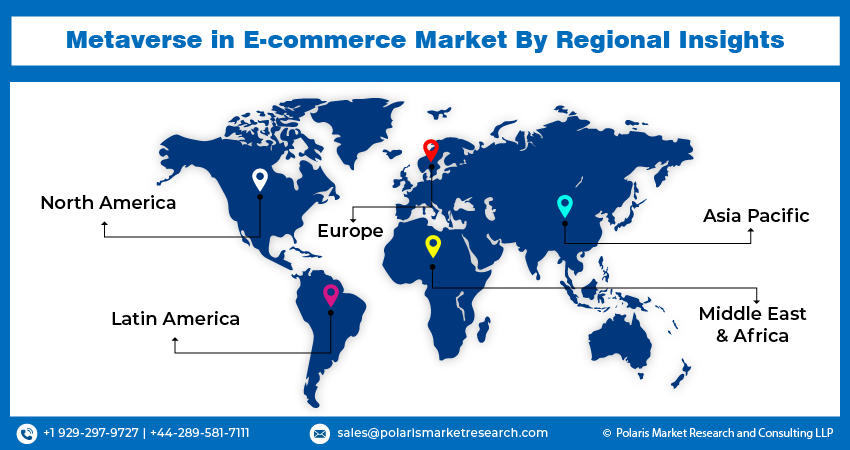
Metaverse in E-commerce Market Share, Size, Trends, Industry Analysis Report, By Platform (Desktop, Mobile/Tablets, AR/VR Headset), By Technology, By Application, By Region, And Segment Forecasts, 2024- 2032
- Published Date:Feb-2024
- Pages: 119
- Format: PDF
- Report ID: PM4366
- Base Year: 2023
- Historical Data: 2019-2022
Report Outlook
The global metaverse in e-commerce market size was valued at USD 20.31 billion in 2023 and is expected to grow at a CAGR of 35.4% during the forecast period.
The proliferation of mobile and wearable devices is playing a pivotal role in integrating the metaverse into the e-commerce landscape. With an expanding user base accessing virtual environments through smartphones, tablets, and wearables, the metaverse is adapting to offer seamless experiences across these devices. E-commerce platforms within the metaverse can leverage this trend, capitalizing on the widespread use of mobile devices to reach a broader audience. This approach provides users with the flexibility to engage in virtual commerce from any location, aligning with the evolving digital landscape where convenience and mobility are prioritized in online interactions. The metaverse, with its focus on mobile accessibility, emerges as a versatile and easily accessible platform for e-commerce activities.

To Understand More About this Research: Request a Free Sample Report
The advent of 5G technology is expediting the integration of the metaverse into e-commerce by enhancing connectivity and enabling low-latency interactions. The high-speed and low-latency features of 5G networks serve as a robust foundation for creating seamless and immersive experiences within the metaverse. E-commerce platforms can harness this improved connectivity to deliver high-quality graphics, real-time interactions, and immediate access to virtual environments. The integration of 5G technology aligns with the industry's pursuit of faster and more responsive online experiences, positioning the metaverse as a technologically advanced arena for e-commerce activities.
The analysis of managed metaverse in e-commerce market extends to a comprehensive market forecast up to 2032, coupled with a retrospective examination. Avail yourself of a complimentary PDF download to sample this in-depth industry analysis. report to suit their needs. By customizing the report, you can get data as per your format and definition. Also, the customization option allows you to gain a deeper dive into a specific segment, region, customer, or market competitor.
Growth Drivers
Incorporation of AI and ML boosting adoption of metaverse in e-commerce
The increasing impact of virtual and augmented reality technologies is driving the widespread adoption of the metaverse in e-commerce. These technologies empower e-commerce platforms to provide progressively lifelike and immersive experiences. Advanced virtual try-on experiences, allowing customers to virtually test products before committing to a purchase, become more refined, thereby bolstering customer confidence and diminishing the likelihood of product returns.
The incorporation of AI and ML technologies propels the advancement of the metaverse in e-commerce. Within the metaverse, AI-driven virtual assistants and chatbots play a crucial role in elevating the customer service experience. These intelligent systems provide personalized recommendations, address queries, and assist users in navigating virtual shopping experiences. The integration of AI in the metaverse enhances the overall efficiency of e-commerce interactions, streamlining processes and elevating user satisfaction.

Report Segmentation
The market is primarily segmented based on platform, technology, application, and region.
|
By Platform |
By Technology |
By Application |
By Region |
|
|
|
|
To Understand the Scope of this Report: Speak to Analyst
By Platform Analysis
AR/VR headsets segment dominated the market in 2023
AR/VR headsets segment accounted for the largest market share in 2023. It is attributed to the heightened visual and sensory experiences it offers. AR/VR headsets deliver quality visuals, audio, and haptic feedback, thereby creating a multi-sensory environment. This enriched sensory experience results in more authentic product interactions and fosters a stronger connection between users and the virtual shopping environment. Additionally, these headsets provide users with a hands-free and intuitive method to navigate virtual spaces, explore products, and complete transactions.
The Mobile/tablets segment will grow rapidly during forecast period. As mobile devices and tablets become increasingly prevalent, users can effortlessly enter virtual environments within the metaverse, effectively turning their devices into portals for immersive and interactive online shopping experiences. The widespread use of mobile and tablet devices enhances the accessibility of the metaverse, enabling a diverse user base to participate in virtual commerce.
By Technology Analysis
Virtual & augmented segment is expected to gain significant attention in the future
The virtual and augmented segment garnered the largest share. The incorporation of VR and AR technologies is a key driver for the growing demand for real-time and interactive customer support in e-commerce. Within the metaverse, virtual storefronts can integrate AI-powered virtual assistants, chatbots, and interactive guides that leverage VR and AR to deliver immediate and personalized assistance to users. These technologies elevate the customer support experience, providing users with interactivity and guidance that goes beyond conventional online support methods.
Edge computing will grow at a significant pace during the forecast period. The increasing need for heightened security and privacy in metaverse interactions is a significant factor propelling the adoption of edge computing. Processing data at the edge ensures that sensitive information remains closer to its source, potentially residing within a user's device. This approach reduces the necessity for extensive data transfers and mitigates security risks associated with centralized processing.
By Application Analysis
Virtual events segment accounted for the largest market share in 2023
The virtual events segment accounted for the largest market share in 2023. The increasing significance of social commerce and community development is a key factor propelling the integration of the virtual events segment into the metaverse. Within the metaverse, virtual events add a social dimension to e-commerce, enabling users to connect in real time, share their experiences, and collectively explore products and services. Businesses can cultivate a sense of community by organizing virtual events that promote social interactions, discussions, and the creation of user-generated content.
For instance, in June 2023, Decentraland recently organized its 3rd annual Metaverse Pride event, a 3-day festival designed to offer immersive experiences, feature art, fashion, and cultural exhibitions, and provide visibility to its community members. The event garnered an impressive attendance of 45.8 Mn participants.

Regional Insights
North America accounted for the largest market share in 2023
North America held the largest market share. The integration of the metaverse into e-commerce is influenced by concerns related to security and privacy. Companies are actively investing in technologies such as blockchain and ML to improve the security and transparency of transactions in the metaverse, thereby addressing consumer worries and fostering trust. This commitment to data security aligns with the region's regulatory landscape and its focus on safeguarding consumer privacy.
APAC will grow at a substantial pace over the forecasted period. The swift urbanization and evolving consumer behaviors in the region play a crucial role in the integration of the metaverse into e-commerce. In response, businesses are adopting metaverse technologies to establish virtual store-fronts, interactive displays, and virtual try-on experiences. This aligns with the changing preferences of the region's digitally connected and expanding consumer base.
Furthermore, the extensive embrace of 5G technology is propelling the market by enabling high-quality virtual experiences. The augmented bandwidth and reduced latency offered by 5G networks empower businesses to establish more immersive and responsive metaverse environments, thereby elevating the overall online shopping experience. With the deployment of 5G infrastructure, businesses are capitalizing on this technological advancement to provide cutting-edge metaverse experiences tailored to the preferences of tech-savvy consumers in the region.

Key Market Players & Competitive Insights
Metaverse in E-commerce Market analysis is marked by a significant level of innovation, driven by the emergence of non-fungible tokens (NFTs) and the digital ownership economy. For instance, blockchain technology, frequently a fundamental component of the metaverse, enables secure and transparent transactions, providing opportunities to explore alternative payment ecosystems. This advancement in financial transactions corresponds to the changing dynamics of digital currencies and provides users with varied and adaptable payment choices within the realm of virtual commerce.
Some of the major players operating in the global market size include:
- Aetsoft Inc.
- Alibaba Group
- Amazon.com Inc.
- Antier Solutions Pvt. Ltd.
- Decentraland
- Epic Games, Inc.
- Innowise Group
- Meta Platform, Inc.
- Microsoft Corporation
- Nextech AR Solutions Corp.
- Nvidia Corporation
- Roblox Corporation
- Tencent Holdings Ltd.
- The Sandbox
- Unity Technologies, Inc.
Recent Developments
- In May 2023, Amazon introduced Amazon Anywhere, a shopping functionality enabling users to purchase physical products from the e-commerce giant within metaverse environments, such as video games and mobile apps.
Metaverse in E-commerce Market Report Scope
|
Report Attributes |
Details |
|
Market size value in 2024 |
USD 27.46 billion |
|
Revenue forecast in 2032 |
USD 309.88 billion |
|
CAGR |
35.4% from 2024 – 2032 |
|
Base year |
2023 |
|
Historical data |
2019 – 2022 |
|
Forecast period |
2024 – 2032 |
|
Quantitative units |
Revenue in USD million/billion and CAGR from 2024 to 2032 |
|
Segments covered |
By Platform, By Technology, By Application, By Region |
|
Regional scope |
North America, Europe, Asia Pacific, Latin America; Middle East & Africa |
|
Customization |
Report customization as per your requirements with respect to countries, region and segmentation. |
Navigate through the intricacies of the 2024 Intelligent metaverse in e-commerce market with precision, thanks to the comprehensive statistics on market share, size, and revenue growth rate assembled by Polaris Market Research Industry Reports. This thorough analysis not only provides a glimpse into the historical context but also extends its reach with a market forecast outlook until 2032. Immerse yourself in the richness of this industry analysis by securing a complimentary PDF download of the sample report.
FAQ's
The Metaverse in E-commerce Market report covering key segments are platform, technology, application, and region.
The global metaverse in e-commerce market size is expected to reach USD 309.88 billion by 2032.
The global metaverse in e-commerce market is expected to grow at a CAGR of 35.4% during the forecast period.
North America regions is leading the global market.
Platform, technology, application, and region are the key driving factors in Metaverse in E-commerce Market.
